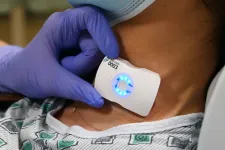(Press-News.org) Patients-turned-social-media-influencers routinely offer prescription drug advice to their followers and often have close ties with pharmaceutical companies, according to new University of Colorado Boulder research.
But they also tend to have good intentions, the study found.
The study, published this week in the Journal of Medical Internet Research, provides some of the first insights into the burgeoning, loosely regulated world of so-called “patient influencers,” sharing findings from 26 in-depth interviews about why and how they do it.
“The bottom line here is that patient influencers act as a form of interactive direct-to-consumer (DTC) advertising, sharing their knowledge and experiences on pharmaceutical drugs with communities of followers in which they wield great influence,” said author Erin Willis, an associate professor of advertising, public relations and media design. “This raises ethical questions that need more investigation.”
The study comes amid growing concerns about the harmful consequences of drug promotion on social media.
In recent weeks, in the wake of a slew of TikTok videos and Twitter posts touting the weight loss benefits of the diabetes drug Ozempic, patients who need the medication to manage their disease have faced global shortages. Meanwhile, those taking it “off-label” to slim down have experienced surprising side-effects, including violent diarrhea and extreme facial thinning.
“This is a great example of the power of social media and the unintended consequences,” said Willis.
A new kind of advertising
Controversial from its start in the 1980s, and still only available in the United States and New Zealand, DTC advertising enables drug companies to target consumers directly, rather than exclusively through physicians. About half of the people who ask their doctor about a drug after seeing a TV ad get it.
With trust in pharmaceutical companies and traditional media declining, drug makers are now turning to real patients as messengers, with companies like Health Union connecting them for partnerships.
Willis conducted one-on-one, hour-long Zoom interviews with influencers with a range of conditions, including lupus, fibromyalgia, Parkinson’s disease, asthma, HIV, celiac disease, chronic migraines and perimenopause. Eighteen of the 26 collaborated with a pharmaceutical company in some way.
Most had between 1,000 and 40,000 followers. Such “micro influencers” tend to be less expensive for advertisers to work with than celebrities, and research has shown they have the most influence on purchasing behaviors, said Willis.
Some interviewees posted company press releases directly. Others read studies about drugs and translated results for followers. Some were paid to post content for drug companies.
“Health literacy and digital literacy are both concerningly low in this country,” said Willis, noting that consumers often fail to recognize the difference between a sponsored ad and an altruistic personal post. “The fact that patients with no medical training are broadly sharing drug information should alarm us.”
Good intentions
On the positive side, Willis was heartened by the reasons participants become influencers.
Almost all said they were drawn to their roles by a sense that the answers they sought as patients, didn’t exist in other channels.
“I spent a lot of time looking for diabetes information that related to me—an African American woman from the South,” reported one study participant. “I didn’t see what I needed, so I created it.”
Others were motivated by a wish to destigmatize disability in certain communities.
“There’s still not a lot of talk about Latinos and HIV,” said another participant. “When there was information, it wasn’t culturally appropriate.”
Five said they never share information about drugs, stating that they believed it was “borderline unethical.”
Others said they would only post about drugs they personally had been prescribed and taken and always encouraged followers to consult with their doctor. They all said they generally strived to behave ethically.
“It’s comforting that the people we interviewed generally want to stay abreast of the science and be a credible source,” said Willis. “But I also know that doctors go to medical school for a reason.”
Concerns abound
Several influencers reported that followers frequently private message them to get detailed information about dosage and side effects.
“In an online community, there are other people there to say, ‘That’s not true or that’s not what I experienced.’” Willis said. “But with social media, a lot of the conversation happens privately.”
Willis also worries that influencers may stress the upsides of medications without fully disclosing the side-effects. For instance, she references a famously controversial 2015 post by celebrity influencer Kim Kardashian, singing the praises of a “#morningsickness” drug called Diclegis to her tens of millions of followers on Instagram.
The Food and Drug Administration swiftly flagged the post for omitting the drug’s long list of risks, required Kardashian to remove the post and dinged the drug maker with a warning letter. The Federal Trade Commission (FTC) now requires influencers to disclose whether they are paid via hashtags, such as #ad or #sponcon, and the Food and Drug Administration has rules on what can be said on social posts. But those rules are open to interpretation, and videos, disappearing content and direct messaging can be tough to track.
Willis acknowledged that her sample was a small one and that because many of her interviewees were referred to her by Health Union, they likely skew to the responsible side. In future studies, she intends to include broader sample sizes, explore how influencers impact treatment decisions and investigate compensation for and regulations around patient influencers.
Analysts predict the influencer marketing industry as a whole will be valued at $21.1 billion in 2023.
As patient influencers increasingly find their place in it, Willis contends that regulators should work harder to keep up with all the new platforms.
“This is happening, with or without regulation, and people should be aware of it,” Willis said.
END
Study sheds light on concerning new trend in drug advertising: Patient influencers
Interviews show patients-turned-social-media influencers often provide advice on drugs and work closely with pharmaceutical companies
2023-03-14
ELSE PRESS RELEASES FROM THIS DATE:
Checking children’s wellbeing: Before and after COVID-19
2023-03-14
A video game featuring a mystical character named Rumble has helped Griffith University researchers investigate how school kids fared following lockdown disruption.
Dr Jacqueline Allen from Griffith’s School of Criminology and Criminal Justice headed up the team looking at self-reported wellbeing in a sample of primary school-aged children in Queensland, Tasmania and Western Australia.
The team used an innovative video game called Rumble’s Quest, developed wholly within Griffith University, which measures the four key facets of wellbeing, as well as ...
Health: Mediterranean diet associated with decreased risk of dementia
2023-03-14
Consumption of a traditional Mediterranean-type diet – rich in foods such as seafood, fruit, and nuts – is associated with a reduced risk of dementia, reports a study published in BMC Medicine. Individuals with a higher adherence to a Mediterranean diet had up to 23% lower risk for dementia compared with those who had lower adherence to a Mediterranean diet.
Diet may be an important modifiable risk factor for dementia that could be targeted for disease prevention and risk reduction but previous studies exploring the impact of a Mediterranean diet have typically been limited to small sample ...
Dizzy apes provide clues on human need for mind altering experiences
2023-03-14
Great apes spinning behaviours could provide clues about the role of altered states for the origins of the human mind.
Online videos observed great apes spin themselves to deliberately make themselves dizzy.
Researchers say these new findings suggest that the behaviour could be used to understand when humans evolved the desire to seek altered mental states and actively manipulate their mood and perception of reality.
Great apes deliberately spin themselves in order make themselves dizzy, academics at the University ...
Mediterranean diet associated with decreased risk of dementia
2023-03-14
Eating a traditional Mediterranean-type diet – rich in foods such as seafood, fruit, and nuts – may help reduce the risk of dementia by almost a quarter, a new study has revealed.
Experts at Newcastle University found that individuals who ate a Mediterranean-like diet had up to 23% lower risk for dementia than those who did not.
This research, published today in BMC Medicine, is one of the biggest studies of its kind as previous studies have typically been limited to small sample sizes and low numbers ...
Gene essential to making DNA appears to be a good target in minimizing pulmonary hypertension
2023-03-14
AUGUSTA, Ga. (March 14, 2023) – The vascular smooth muscle cells that normally give blood vessel walls strength and flexibility proliferate and become destructive in pulmonary hypertension, a typically rapidly progressing condition that makes it hard to get blood inside our lungs and oxygen to our bodies.
Now scientists have found that inhibiting a gene essential to making DNA so the cells can take on this uncharacteristic growth, can significantly reduce the destructive cell proliferation and disease progression, they report in the European Heart Journal.
The findings point toward a ...
Endometriosis: how to diagnose and manage this complex condition
2023-03-14
Endometriosis is a painful, complex condition affecting about 1 in 10 women of reproductive age, but it is poorly understood. A new clinical review published in CMAJ (Canadian Medical Association Journal) https://www.cmaj.ca/lookup/doi/10.1503/cmaj.220637 provides an overview of the causes, diagnosis and management of endometriosis based on the latest evidence, to help clinicians and patients.
The review is timely, as March is Endometriosis Awareness Month.
Endometriosis, defined as the presence of endometrial-like tissue outside the uterus, is one of the most common gynecologic conditions. It is estimated to affect approximately 1 million women ...
California schools are not immune to political attacks
2023-03-14
A new analysis by researchers at UCLA and UC Riverside shows that even in Blue state California, political attacks on public schools are pervasive and growing, hindering learning and the role schools play in a diverse democracy. Political division and community-level conflict is negatively impacting student interactions, and many California students are experiencing hostility and intolerance in school. Troublingly, the research finds high levels of hostile comments toward LGBTQ students, and racist remarks targeting Latino, and in particular, African American ...
El Camino Health is first in the world to adopt FloPatch advanced ultrasound technology for sepsis management
2023-03-14
El Camino Health is the first health system in the world to adopt FloPatch, an innovative new technology that monitors blood flow in real time. Developed by Flosonics Medical, FloPatch is the world’s first wireless, wearable Doppler ultra-sound system that helps clinicians better manage intravenous (IV) fluid therapy earlier in the sepsis care pathway.
“Timing is crucial when caring for patients with sepsis. Our nurses have seen firsthand how effective FloPatch is in monitoring the effectiveness of treatment in deteriorating patients, especially those with sepsis and low blood pressure,” said Cheryl Reinking, chief nursing officer at El Camino Health. “We ...
Scientists reveal a potential new approach to treating liver cancer
2023-03-13
Scientists reveal a potential new approach to treating liver cancer
Results in cell and mouse studies may have implications for the development of a new class of anticancer drugs
Scientists at the National Institutes of Health and Massachusetts General Hospital in Boston have uncovered a potential new approach against liver cancer that could lead to the development of a new class of anticancer drugs. In a series of experiments in cells and mice, researchers found that an enzyme produced in liver cancer ...
City of Hope scientists reveal how XBP1s interacts with IL-15 to enhance the survival of natural killer cells
2023-03-13
FINDINGS
A new study published in Science Immunology points to a promising therapeutic approach for future cancer treatments based on natural killer cells (NK), which are immune cells that bind to tumor cells and destroy them.
City of Hope scientists created a knockout mouse model for a protein called XBP1s to explore the molecule’s effect on NK cells and its role in fighting cancer. Earlier studies showed that XBPIs strengthened the survival of NK cells, but precisely how was unclear.
The team identified a previously unknown mechanism in which interleukin-15 (IL-15) — a protein naturally ...
LAST 30 PRESS RELEASES:
The world’s largest brain research prize awarded for groundbreaking discoveries on how we sense touch and pain
Magnetofluids help to overcome challenges in left atrial appendage occlusion
Brain-clearing cells offer clues to slowing Alzheimer’s disease progression
mRNA therapy restores fertility in genetically infertile mice
Cloaked stem cells evade immune rejection in mice, pointing to a potential universal donor cell line
Growth in telemedicine has not improved mental health care access in rural areas, study finds
Pitt scientists engineer “living eye drop” to support corneal healing
Outcomes of older adults with advanced cancer who prefer quality of life vs prolonging survival
Lower music volume levels in fitness class and perceived exercise intensity
Of crocodiles, counting and conferences
AERA announces 2026 award winners in education research
Saving two lives with one fruit drop
Photonic chips advance real-time learning in spiking neural systems
Share of migratory wild animal species with declining populations despite UN treaty protections worsens from 44% to 49% in two years; 24% face extinction, up 2%
One in 20 babies experiences physical abuse, global review finds
Tundra tongue: The science behind a very cold mistake
Targeting a dangerous gut infection
Scientists successfully harvest chickpeas from “moon dirt”
Teen aggression a warning sign for faster aging later in life
Study confirms food fortification is highly cost-effective in fighting hidden hunger across 63 countries
Special issue elevates disease ecology in marine management
A kaleidoscope of cosmic collisions: the new catalogue of gravitational signals from LIGO, Virgo and KAGRA
New catalog more than doubles the number of gravitational-wave detections made by LIGO, Virgo, and KAGRA observatories
Antifibrotic drug shows promise for premature ovarian insufficiency
Altered copper metabolism is a crucial factor in inflammatory bone diseases
Real-time imaging of microplastics in the body improves understanding of health risks
Reconstructing the world’s ant diversity in 3D
UMD entomologist helps bring the world’s ant diversity to life in 3D imagery
ESA’s Mars orbiters watch solar superstorm hit the Red Planet
The secret lives of catalysts: How microscopic networks power reactions
[Press-News.org] Study sheds light on concerning new trend in drug advertising: Patient influencersInterviews show patients-turned-social-media influencers often provide advice on drugs and work closely with pharmaceutical companies




